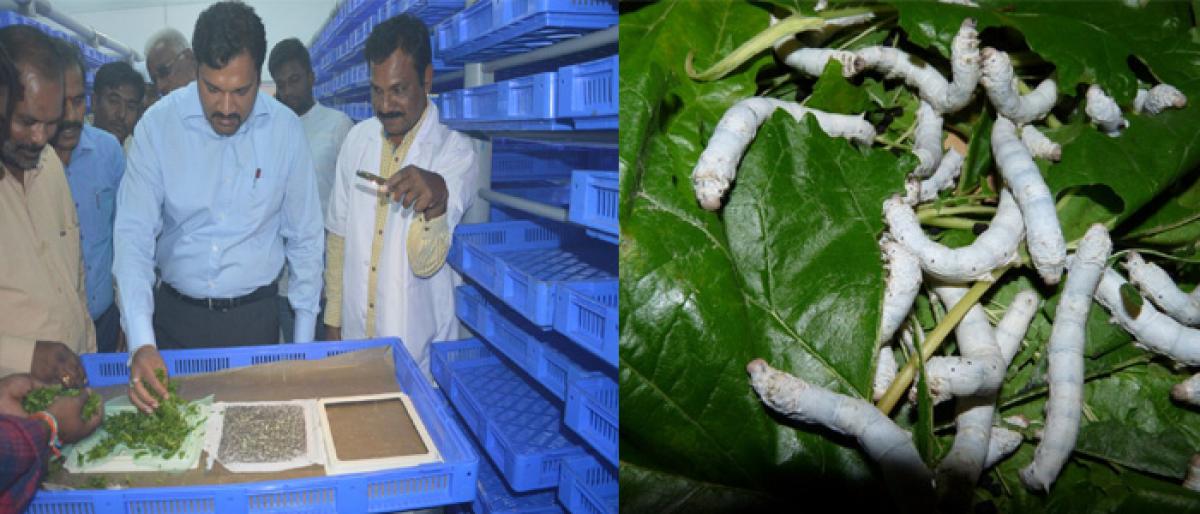Live
- RG Kar tragedy: Statement of forensic doctor who took pictures of victim’s body crucial for CBI
- Include Valmiki community in ST list, MP Ambica pleads
- Chandrababu Advocates Strict Measures for Social Welfare and Infrastructure Development in AP
- Show of brotherhood by Vijayan, Stalin at event to honour Dravidian icon
- District Collectors’ conference with CM begins
- Celebrations kick off in Saudi Arabia to welcome FIFA World Cup 2034
- Google Unveils Jules AI to Help Developers Fix Code Errors
- Bengaluru Techie’s Tragic Suicide Sparks Outrage Over Family Disputes and Legal Failures
- Crucial Union Cabinet meeting to discuss One Nation One Election
- Irrigation AE Nikhesh Kumar Arrested in Disproportionate Assets Case, Granted 4-Day Custody
Just In

For farmers who are willing to do hard work, there is nothing like sericulture, according to Gadwal District Collector Rajat Kumar Saini. The District Collector inaugurated first-of-its-kind ‘Chaki Silkworm Breeding Centre’ in Mandoddi village of Rajouli mandal in the district on Tuesday.
Gadwal: For farmers who are willing to do hard work, there is nothing like sericulture, according to Gadwal District Collector Rajat Kumar Saini. The District Collector inaugurated first-of-its-kind ‘Chaki Silkworm Breeding Centre’ in Mandoddi village of Rajouli mandal in the district on Tuesday.
The new centre has been established by Pratap Goud, a silkworm rearing farmer from Mandoddi village with the help and coordination of Horticulture and Sericulture departments in the district. Speaking on the occasion, the Collector said, “There is no substitute for hard work and for farmers who are willing to put their best efforts, then sericulture is one of the best farming they can choose as it gives better returns.”
Explaining that unlike other farming sectors, where farmers have to wait for returns only after three to four months, in sericulture they can get back their returns in just 28 days, he said, however it involved a lot of efforts and hard work as farmers had to take good care of silkworms by feeding them with mulberry leaves until they reached the harvesting stage.
“Silkworm culture need more care and farmers must follow suggestions and ideas of sericulture scientists and officials of Horticulture department from time to time. In a year, rearing silkworm over three acres of land can gain a profit of more than Rs 5 lakh, excluding all the costs. Moreover, unlike other crops, the demand for silk is very high in India and therefore once established, a farmer can sustain this farming for more than 50 years without any downfall,” observed the Collector, while explaining better prospects of sericulture farming and its future.
Currently, China is leading in the world in the production of silk. It is estimated that the country produces more than 1.6 lakh metric tonnes of silk annually, while India produces only 30,000 metric tonnes. However, the use of silk in India is very high. India stands second only to China in utilising silk as its favourite fabric.
“As sericulture is having great demand in the country, there is a lot of scope for farmers and they can happily sustain their business for the next 50 years without any problem,” opined the Collector. He gave a call to all farmers in the district to adopt sericulture and take maximum advantage as they can secure 80 per cent subsidy from the government.
At present, the farmers are growing mulberry plantation over more than 200 acres in Gadwal.
Till recently, farmers from Gadwal used to go to Raichur, Hosur and other areas in Karnataka for procuring mulberry insects (Chaki worms) and faced many problems. However, with the opening of a new centre in Gadwal now, they can procure their Chaki worms within the district. “This is the only centre in the entire erstwhile Mahbubnagar district. Unlike earlier, now we are providing mulberry worms at our centre and farmers can get them at affordable rates. Farmers from not only Gadwal, but from other districts also can now easily procure their requirement from Gadwal,” said Pratab Goud.
Pratap Goud, who evinced interests in the setting up of the silkworm breeding centre was taken to Mysore and was trained by the government. The total cost of setting up of the centre was Rs 10 lakhs, however, the government provided a subsidy of Rs 8 lakh while Rs 2 lakh was borne by the farmer.

© 2024 Hyderabad Media House Limited/The Hans India. All rights reserved. Powered by hocalwire.com







